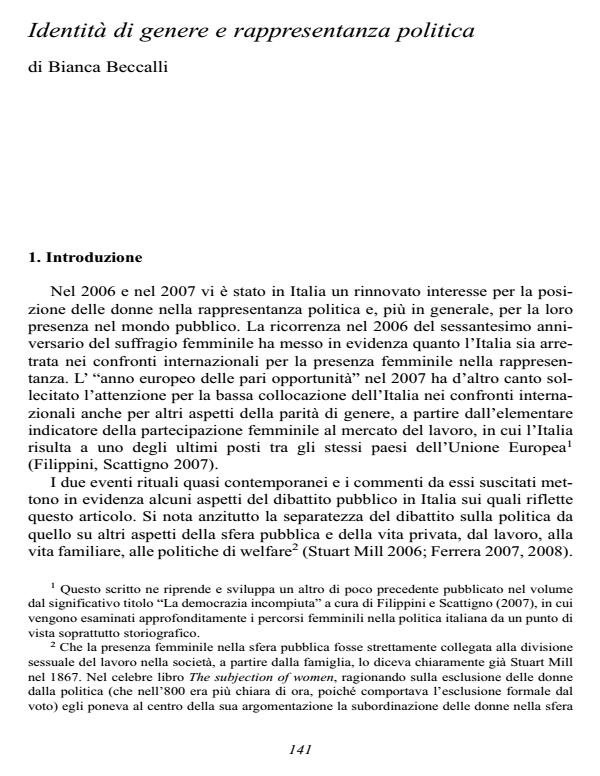Gender identity and political representation
Journal title PARTECIPAZIONE E CONFLITTO
Author/s Bianca Beccalli
Publishing Year 1905 Issue 2008/0
Language Italian Pages 16 P. File size 95 KB
DOI
DOI is like a bar code for intellectual property: to have more infomation
click here
Below, you can see the article first page
If you want to buy this article in PDF format, you can do it, following the instructions to buy download credits

FrancoAngeli is member of Publishers International Linking Association, Inc (PILA), a not-for-profit association which run the CrossRef service enabling links to and from online scholarly content.
The occasion for the article is the public debate around the decline of women’s participation in the political process in Italy since the mid 1990’s and during the following decade; the debate has addressed the reasons of the phenomenon, as well as the issue of whether and how to contrast the trend. The thesis of women’s "natural" distance from formal democratic politics has emerged as an influential point of view in the debate, shared by scholars and social actors from different backgrounds, such as a number of feminists, neo-liberal theorists, and religious neo-conservatives. According to this point of view, the marginal position of women in politics, and in the positions of power in general, is due to their own choices, to their "preferences". Preference theory, with its essentialist overtones, is a main polemical target of the article. In order to denaturalize the relationship between gender identity and political participation, the Italian case is examined in a historical perspective, and it is compared to other national cases; also the different national strategies of promotion of women are considered. The historical and international variations are remarkable, and call for- historical and sociological explanations. In the background of the article lay these general questions: a) within the realm of politics, different modes of political participation have to be considered: participatory democracy and representative democracy are two poles which regard the whole range of democratic activities, but which are particularly relevant to the fluctuating participation of women. b) How much is "politics" special in promotion of marginal groups? Different social areas, such as the sphere of work, show patterns of marginalisation of vertical and horizontal segregation, and are possible targets of positive actions. c) The "justification" of the need of women’s presence in representative democracy as some specific characteristics, which the article deals with, namely the frame of the equal opportunities approach, the mirror democracy theory, and deficit of democracy approach. The tree different perspectives are discussed at the end of the article.
Keywords: Women’s Participation; Feminism; Essentialism; Democracy Theory; Segregation.
Bianca Beccalli, Identità di genere e rappresentanza politica in "PARTECIPAZIONE E CONFLITTO" 0/2008, pp , DOI: